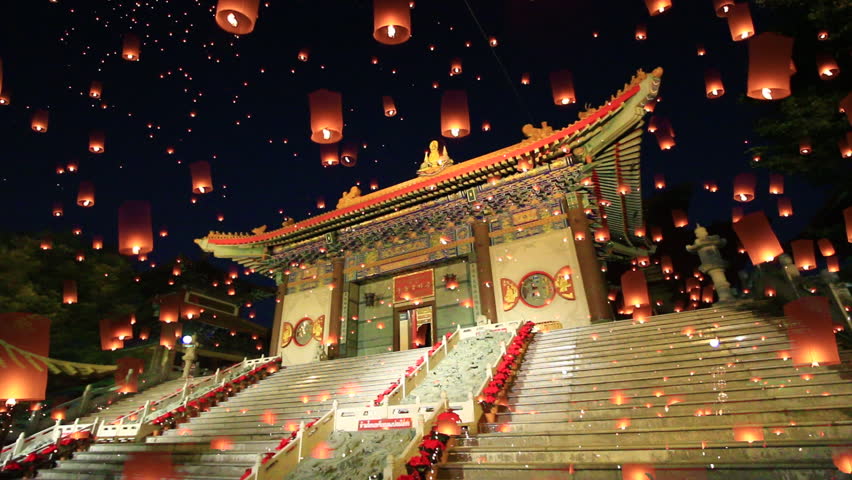
Origins
The origin of the Hungry Ghost festival, also known as Zhongyuan Jie, is said to have originated from an old story where a monk asks the Buddha to help his mother in the afterlife as she was very hungry, but she could not eat because she was a ghost. So, Buddha instructs to offer food and clothing to the monks, this helped his mother’s hunger and she was then reborn. The origin of this tradition is known to be a traditional Buddhist and Taoist festival held in most East Asian countries.
The Hungry Ghost Festival is celebrated on the 15th day of the seventh lunar month, where the gates of heaven and hell are said to open (July or August in our Western calendar). The Ghosts, who are believed to be ancestors of those who forgot to pay tribute to them after they died, or those who were never given a proper ritual send-off, roam the streets for the whole seventh lunar month.
Symbolism of the Ghost
Ghosts are said to be malicious and attack their enemies as they are angry from their past, so the Chinese people have numerous traditions to keep the ghosts happy. Ghost are said to be roaming the streets looking for entertainment, food and gifts as it is thought that after two weeks of activity, they must be hungry.
There are numerous traditions in order to avoid the unpleasant Ghosts, and many Chinese people try to avoid being alone at night, as an enemy ghost many come after them. They try their best to avoid any risky behaviour during this time including not to making serious decisions such as signing contracts, or banking. Other behaviours to avoid during this time includes:
- Do not talk about the Hungry Ghost festival, seeing as it may attract ghosts
- Do not go swimming, especially alone at night- you become vulnerable to the ghosts
- Do not leave clothes outside to dry, as it is said that the ghost can try them on & leave negative energy behind
- Don’t take photos at night, as you may capture a spirit on film.
- Avoid trees and forests, it is said that ghosts hang around trees at night
- Don’t leave your chopsticks standing upright in your bowl of food (as they may resemble joss sticks) which is an offering to the dead-and may attract the ghosts.
The First Day of Hungry Ghost Month
Many special ceremonies are performed during this time to avoid the wrath of the ghosts. The main ceremony is usually held at dusk, where people gather in the streets, community centres, homes and temples. This is where they put the family’s ancestral tablets, old paintings and photographs on a table and burn incense near them.

The Grand Sacrifice ceremony
The grand sacrifice ceremony is a ceremonial offering of a good meal to show respect & make sacrifices of food to worship the hungry ghosts. Plates of food are put out for the ghosts on a table, and the people “kowtow” in front of the memorial tablets. The ancestors of the Ghost report their behaviour to receive a blessing or punishment, based on their actions.
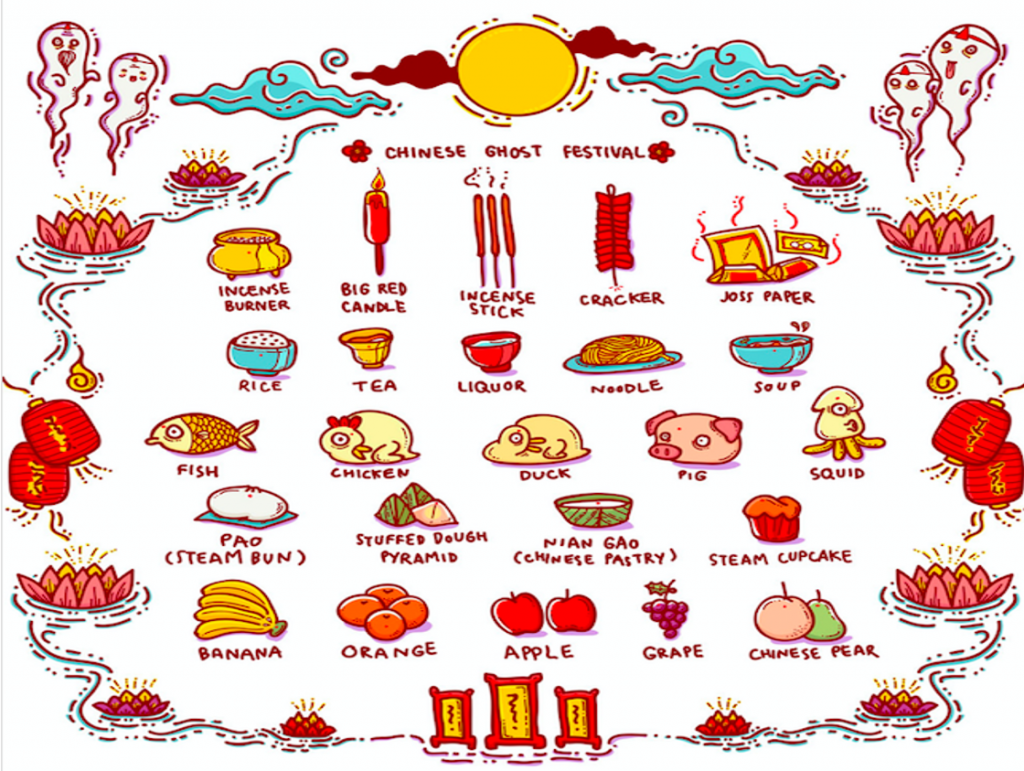
The night is filled with people feasting in the streets, and an open place is left at the table for lost ancestors. Food that is often offered at this festival includes traditional Chinese dishes: rice, tea, noodles, soup, fish, chicken, duck, pig, squid, Pao, stuffed dough, pastries along with fruits and liquor.
Traditions
During this festival, people burn joss paper (make-believe paper money) outside their homes or businesses, and alongside roads & temples. They offer this fake money because they want to give the ghosts money they need during their special month in order to celebrate them. People also have trust in the ghosts that they will treat them more kindly after eating their sacrifices and holding their money.

Burning of joss paper to the ghosts 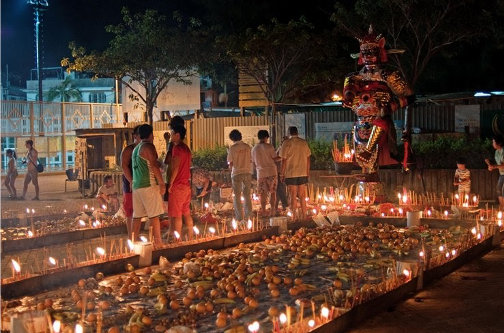
Lighting of incense
Another tradition includes lighting incense all day and night, as they want to please the ghosts and make them feel welcome to the earth.
Papier-mâché and paper “items” are made and sold, then burned to offer to the ghosts. These items are made in the form of material items such as clothes, gold, fake tablets or phones and other fine goods for the visiting spirits of the ancestors. They also put up red painted paper lanterns everywhere including business and residential areas to attract the ghosts.
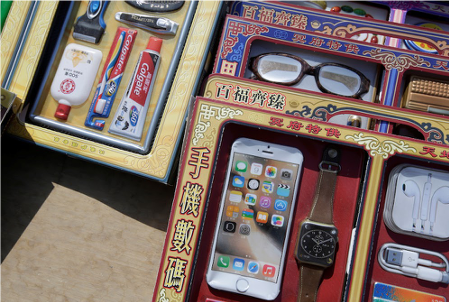
Fake paper mâché items 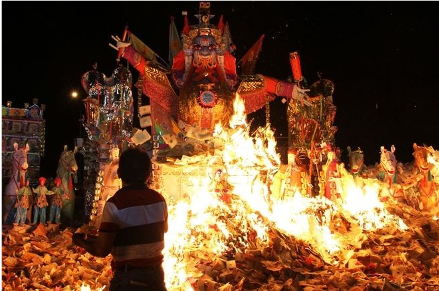
Burning of the items offered
Last day of the Hungry Ghost Month
The last day of the seventh lunar month is marked with a special festival, this is the day that the gates of hell are closed. Many people burn more paper money and clothing so that the ghosts can use these things in their hell society. The pictures and tablets of ancestors may be put away back on the shelves or hung back on the walls where they were before.
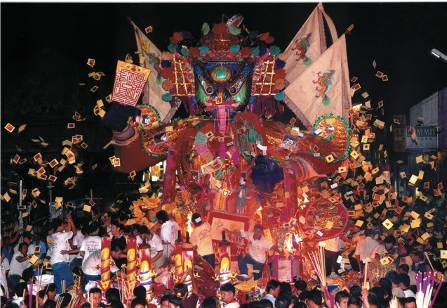
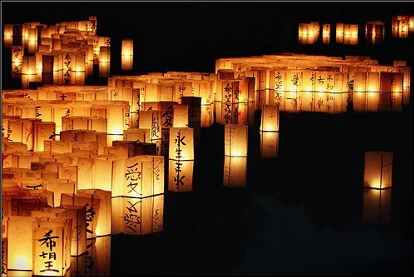
Families float river lanterns on little boats in the evening, that are made of colorful paper and wood, and families write their ancestors’ name on the lanterns. The ghosts are believed to follow the floating river lanterns away. In order to drive the ghosts away, Taoist monks hold a ceremony, where they chant to make them leave as the ghosts are thought to hate the sound, and therefore scream and leave back to hell.